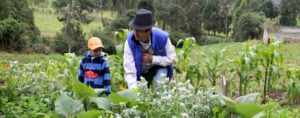
LANDac, the Netherlands Academy on Land Governance for Equitable and Sustainable Development, held its annual international conference on June 28-29 in Utrecht, the Netherlands.
Titled “Land governance and (im)mobility”, the conference explored the nexus between land acquisition, displacement and migration.
On the second day of the event, the wide range of parallel sessions included “‘Good Enough Tenure’ in Sustainable Forest and Land Management”, organized by Tropenbos International (TBI), in collaboration with the universities of Wageningen, Freiburg, Campinas and Kyoto, Kadaster Internationaal, the Center for International Forestry Research (CIFOR) and the CGIAR Research Program on Forests, Trees and Agroforestry (FTA).
The session discussed the practical implications of the increasing evidence from research and experiences in different parts of the world on the value and scope of so-called ‘good enough tenure’ arrangements for international and national policymakers and investors.
The main message that emerged from the panel session was that all players need to think beyond formal land regularization to provide enabling conditions for smallholders to secure property rights and incentives for investment.
A lack of formally recognized land and resource property has always been a constraint for small-scale farmers and forest communities. Mainstream land governance focusses largely on tenure regularization as a means to provide security. Smallholders without such formal tenure tend to be excluded from external funding streams, because banks, other private investors, governmental agencies and even some donors often require land titles as collateral to mitigate the risk of default from failed investment.
As a result, these actors have not been able to deal effectively with the mobility and the complex local reality, including the local needs and opportunities that exist in rural and forest areas in tropical countries.
The four panelists – Marieke van der Zon of Wageningen University, Kyoto University and TBI; Peter Cronkleton of CIFOR; Bastian Reydon of Universidade Estadual de Campinas’ Land Governance Group; and Benno Pokorny of University Freiburg – provided hands-on examples from Latin America, providing evidence that there is a variety of formal, informal and semiformal tenure situations and arrangements in these areas.
In many cases these informal, traditional and semiformal property rights are considered good enough for social and economic development and for conservation, as they are respected, upheld and protected by strong local institutions. These good-enough tenure right arrangements should be fully acknowledged as a valuable “local institutional capital” for making trustful and secure arrangements between local smallholders and external actors to engage, to invest and collaborate on a reciprocal basis.
They must therefore play a much more prominent starting point in promoting sustainable, inclusive and equitable development, with the panelists emphasizing the need to understand the local specificity of arrangements, advocating a “fit-for-purpose and place” approach.
Read the panelists’ abstracts:
- Successful community forest management without formal ownership rights: a fuzzy-set Qualitative Comparative Analysis of twelve voluntary forest management initiatives in the Peruvian Amazon
- Migration patterns and property rights variation on forest frontiers in the Peruvian Amazon
- Clarifying and strengthening informal land ownership using the fit-for-purpose approach (Mato Grosso, Brazil)
- Taken at the flood. A look on the resilience of local norms of land uses in the Eastern Amazon
View the presentations from the session:
- Successful community forest management without formal ownership rights in the Peruvian Amazon
- Migration patterns and property rights variation on forest frontiers in the Peruvian Amazon
- Fit for Purpose approach for tenure security
- Taken at the flood. A look on the resilience of local norms of land uses in the Eastern Amazon
Adapted from the article first published by Tropenbos International.











